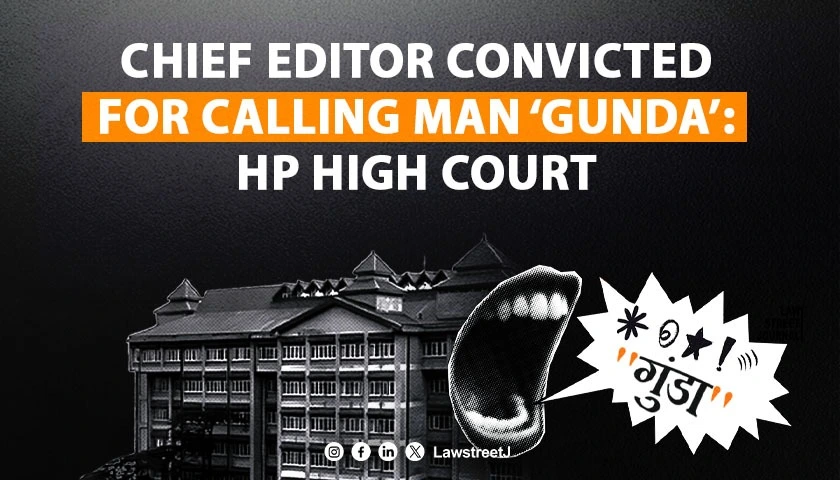Himachal: The Himachal Pradesh High Court has delivered a significant judgment, holding that calling a person a “Gunda” and accusing them of disturbing the peace and spreading “Gundaraj” without justification amounts to defamation punishable under Section 500 of the Indian Penal Code.
Justice Rakesh Kainthla made this observation while addressing a criminal appeal filed by Gopal Chand against the acquittal of two accused persons by the trial court. The case stemmed from a defamation complaint regarding a news item published in the Him Ujala newspaper containing derogatory allegations against the complainant.
Addressing the language used in the publication, the court noted that the news item referred to the complainant as part of a “Shallow Drama Troupe” and accused him of “disturbing the peace and spreading Gundaraj.” The court emphasized that calling a person a “Gunda” is inherently defamatory, citing multiple High Court precedents.
It further highlighted the legal principle concerning defamatory publications, stating, “Every republication of a libel is a new libel, and each publisher is answerable for his act to the same extent as if the calumny originated with him.”
In examining the defense of good faith, the court observed that publishers must demonstrate they conducted reasonable inquiries before publication. It stated, “The person pleading good faith has to show that he had made a reasonable inquiry regarding the correctness of the imputations published by him.”
The court also clarified that the mere repetition of defamatory content does not absolve the publisher of liability, noting, “The repetition of libel is an offence, and the repeater cannot take shelter behind the plea that he had merely repeated what was said by another.”
Regarding the burden of proof for malicious intent, the court held, “To bring the publication of a scandalous imputation under the penal law, it is not necessary to prove that it was done out of any ill will or malice. It is sufficient to show that the accused intended, knew, or had reason to believe that the imputation made by him would harm the reputation of the complainant.”
The court distinguished between the two accused, finding that while the evidence against the first accused (who allegedly provided the press note) was insufficient, the second accused (the Chief Editor) could not escape liability merely by claiming to be a “Chief Editor” rather than an “Editor.”
Accordingly, the court set aside the acquittal of the Chief Editor, convicted him under Section 500 of the IPC, and directed that he be produced before the court for sentencing on July 24, 2025.
Case Title: Gopal Chand vs. Ramesh Kumar and Another



![Himachal HC Grants Bail to Man Accused of Unnatural Acts with Cow [READ ORDER]](/secure/uploads/2020/11/lj_8855_Himachal_Pradesh_High_Court.jpeg)
![Remaining in India after expiry of visa is offence, Himachal Pradesh HC reiterates while denying bail [Read Petition]](/secure/uploads/2023/12/lj_3841_e40384f4-2611-4a51-b179-97824c5e53c7.jpg)

![Supreme Court Stays Himachal Pradesh HC Order, Sanjay Kundu to Remain as State DGP Amid Businessman's Complaint [Read Order]](/secure/uploads/2024/01/lj_5499_5a926c6d-aa3b-4344-b54d-2c7fc5145ace.jpg)




